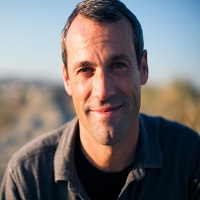Jen Pahlka and her team at Code for America recently moved into a light-filled office five floors above Mission Street in San Francisco, appropriately plopped between the Civic Center and the startups of SOMA. On the wall above a conference table in the corner in three-foot high lettering is a rallying cry of sorts: No one is coming. It’s up to us.
On the 33rd day of a federal government shutdown, Pahlka sat in a room named National Park Service—all Code for America meeting rooms are named for departments of government—and pondered the state of civic participation. Back in 2013-14 she spent a year in the Obama Administration as the U.S. Deputy Chief Technology Officer and helped to design and launch the United States Digital Service.
“Now more than ever we need people in public service with integrity, empathy, and great skills in improving government,” she said, sipping from a mug of tea. “It’s a terrible message of how we value public servants.”
Pahlka launched CFA in 2011 as a one-year fellowship program in the spirit of AmeriCorps or Teach for America, deploying programmers and designers to work with city governments to develop bottom-up, user-centered tech solutions for civic problems—hacking for good. Along with “brigades” of volunteers now in 75 cities, CFA fellows developed an array of solutions—from text bots that tell people where they can find available shelter space during a disaster, to an “adopt a hydrant” app for residents to support local infrastructure.
Everything Code for America creates is made publicly available—open sourced—leaving that code readily adaptable to other contexts and locations. “The two biggest levers for change in our society are technology and government,” said Pahlka. “We need to recognize that and invest in it.”
Take food stamps—in California some 10 million people are eligible but don’t receive those benefits, one of the lowest participation rates in the country. Why? Getting through the online process was a technical and logistical obstacle course of documents, phone interviews, and often mail-based correspondence. None of the three different existing web applications work on a mobile phone.
“People would say, ‘well I got a letter in the mail telling me when my interview is, but the letter came after the date of the interview’,” said Pahlka. “Or it would come in Mandarin, even if you don’t speak Mandarin.”
Code for America created the “digital assister” app GetCalFresh, simplifying the application process to under 10 minutes. It then follows up with custom text messages. Now, county welfare directors push users to GetCalFresh, says Pahlka, and the numbers are on the rise, some 20,000 new applications completed every month.
Building on the user-centered lessons from the GetCalFresh initiative, Pahlka’s team in 2016 created Clear My Record, a free online tool that guides users through the complicated process of clearing a criminal record for low-level offenses, which can be an impediment to landing a job, getting a loan or even voting. With Clear My Record, people fill out a simple application and connect with public defenders or legal aid resources.
Prop 64, which legalized marijuana in California, created fertile ground for a San Francisco pilot of an automated version of Clear My Record. The proposition included a provision that allows people with old cannabis convictions to expunge their records, but that takes money, determination and patience. Code for America is working with the San Francisco district attorney’s office on a fully automated version of Clear My Record that uses a learning algorithm to analyze rap sheets for relevant convictions. In April, the Los Angeles County District Attorney’s Office announced that it, too, would employ Code for America in its attempt to clear more than 50,000 cannabis records.
“We don’t even have to talk to you,” said Pahlka. “It just comes off your record.” By the end of the year, Pahlka hopes to have expanded to other California counties.
Governor Gavin Newsom’s proposed 2019-2020 budget includes funds for an Office of Digital Innovation, an indication of progress to Pahlka. “Will things change for the better?” she asked. “I’m certain that it will. We actually think government services could delight users.”























